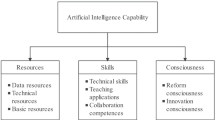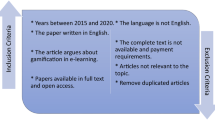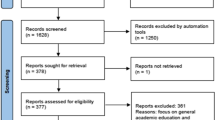Abstract
This study developed and compared two augmented reality learning systems for third-grade students to learn English vocabulary in situated surroundings. One system was developed based on a collective game-based (CGB) design, in which the students had to collect all seven reality targets without being restricted as to which they could start from. The other system was developed based on a sequential-mission gaming (SMG) design, which provided the students with seven stages to complete in sequence. The effects of gender and system on the students’ flow experience, cognitive load, and learning effectiveness were assessed. The results indicated that the students using the two systems had similarly high learning effectiveness. However, those using the CGB system revealed higher flow experience and lower intrinsic cognitive loads in comparison with those using the SMG system. The male students had high flow experience in both systems; however, the flow experience of the females in the CGB system outperformed that of the females in the SMG system.





Similar content being viewed by others
References
Al-Fahad, F.N.: Students’ attitudes and perceptions towards the effectiveness of mobile learning in King Saud University, Saudi Arabia. Online Submiss 8(2), 1–9 (2009)
Anderson, J.R., Reder, L.M., Simon, H.A.: Situated learning and education. Educ. Res. 25(4), 5–11 (1996)
Azuma, R.T.: A survey of augmented reality. Presence 6(4), 355–385 (1997)
Balog, A., Pribeanu, C., Iordache, D.: Augmented reality in schools: preliminary evaluation results from a summer school. Int. J. Soc. Sci. 2(3), 163–166 (2007)
Barzilai, S., Blau, I.: Scaffolding game-based learning: Impact on learning achievements, perceived learning, and game experiences. Comput. Educ. 70, 65–79 (2014)
Bressler, D.M.: Is it all in the game? Flow experience and scientific practices during an INPLACE mobile game. Dissertation, Lehigh University (2014)
Chang, K.E., Wu, L.J., Weng, S.E., Sung, Y.T.: Embedding game-based problem-solving phase into problem-posing system for mathematics learning. Comput. Educ. 58(2), 775–786 (2012)
Chee, Y.S., Tan, K.C.D., Tan, E.M., Jan, M.F.: Learning chemistry performatively: epistemological and pedagogical bases of design-for-learning with computer and video games. In: Tan, K.C.D., Kim, M. (eds.) Issues and Challenges in Science Education Research, pp. 245–262. Springer, Netherlands (2012)
Chen, J., Kinshuk, J.: Mobile technology in educational services. J. Educ. Multimed. Hypermedia 14(1), 91–109 (2005)
Chen, C.M., Tsai, Y.N.: Interactive augmented reality system for enhancing library instruction in elementary schools. Comput. Educ. 59(2), 638–652 (2012)
Cheng, T.S., Lu, Y.C., Yang, C.S.: Using the multi-display teaching system to lower cognitive load. J. Educ. Technol. Soc. 18(4), 128–140 (2015)
Chien, Y.T., Chang, C.Y.: Comparison of different instructional multimedia designs for improving student science-process skill learning. J. Sci. Educ. Technol. 21(1), 106–113 (2012)
Clark, D.B., Martinez-Garza, M.: 18 Prediction and explanation as design mechanics in conceptually integrated digital games to help players articulate the tacit understandings they build through game play. In: Steinkuehler, C., Squire, K., Barab, S. (eds.) Games, Learning, and Society: Learning and Meaning in the Digital age, pp. 279–305. Cambridge University Press, London (2012)
Corkill, A.J.: Advance organizers: facilitators of recall. Educ. Psychol. Rev. 4(1), 33–67 (1992)
Csikszentmihalyi, M.: Beyond Anxiety and Boredom: The Experience of Play in Work and Games. Jossey-Bass, San Francisco (1975)
Erhel, S., Jamet, E.: Digital game-based learning: impact of instructions and feedback on motivation and learning effectiveness. Comput. Educ. 67, 156–167 (2013)
Echeverría, A., Améstica, M., Gil, F., Nussbaum, M., Barrios, E., Leclerc, S.: Exploring different technological platforms for supporting co-located collaborative games in the classroom. Comput. Hum. Behav. 28(4), 1170–1177 (2012)
Gibson, D., Aldrich, C., Prensky, M.: Games and Simulations in Online Learning: Research and Development. Covent Garden, London (2007)
Golonka, E.M., Bowles, A.R., Frank, V.M., Richardson, D.L., Freynik, S.: Technologies for foreign language learning: a review of technology types and their effectiveness. Comput. Assist. Lang. Learn. 27(1), 70–105 (2014)
Habgood, M.J., Ainsworth, S.E.: Motivating children to learn effectively: exploring the value of intrinsic integration in educational games. J. Learn. Sci. 20(2), 169–206 (2011)
Hsieh, Y.H., Lin, Y.C., Hou, H.T.: Exploring elementary-school students’ engagement patterns in a game-based learning environment. J. Educ. Technol. Soc. 18(2), 336–348 (2015)
Ho, P.C., Chung, S.M., Lin, Y.H.: Influences on children’s visual cognition capabilities through playing’ intelligent matrix’ developed by the augmented virtual reality technology. Int. J. Humanit. Arts Comput. 6(1–2), 160–171 (2012)
Hogle, J.G.: Considering games as cognitive tools: in search of effective edutainment. Dissertation, University of Georgia (1996)
Hou, H.T., Li, M.C.: Evaluating multiple aspects of a digital educational problem-solving-based adventure game. Comput. Hum. Behav. 30, 29–38 (2014)
Huyen, N.T.T., Nga, K.T.T.: Learning vocabulary through games. Asian EFL J. 5(4), 90–105 (2003)
Hwang, G.J., Chiu, L.Y., Chen, C.H.: A contextual game-based learning approach to improving students’ inquiry-based learning performance in social studies courses. Comput. Educ. 81, 13–25 (2015)
Hwang, G.J., Yang, L.H., Wang, S.Y.: A concept map-embedded educational computer game for improving students’ learning performance in natural science courses. Comput. Educ. 69, 121–130 (2013)
Ke, F., Abras, T.: Games for engaged learning of middle school children with special learning needs. Br. J. Educ. Technol. 44(2), 225–242 (2013)
Kesim, M., Ozarslan, Y.: Augmented reality in education: current technologies and the potential for education. Proc. Soc. Behav. Sci. 47, 297–302 (2012)
Kiili, K., de Freitas, S., Arnab, S., Lainema, T.: The design principles for flow experience in educational games. Proc. Comput. Sci. 15, 78–91 (2012)
Kutulakos, K.N., Vallino, J.R.: Calibration-free augmented reality. IEEE Trans. Vis. Comput. Graph. 4(1), 1–20 (1998)
Liu, T.Y., Chu, Y.L.: Using ubiquitous games in an English listening and speaking course: Impact on learning outcomes and motivation. Comput. Educ. 55(2), 630–643 (2010)
Mayer, R.E.: Can advance organizers influence meaningful learning? Rev. Educ. Res. 49, 371–383 (1979)
McLean, J.E., Ernest, J.M.: The role of statistical significance testing in educational research. Res. Schools 5(2), 15–22 (1998)
Milgram, P., Kishino, F.: A taxonomy of mixed reality visual displays. IEICE Trans. Inf. Syst. 77(12), 1321–1329 (1994)
Mueller, J.L., Wood, E., De Pasquale, D., Cruikshank, R.: Examining mobile technology in higher education: handheld devices in and out of the classroom. Int. J. Higher Educ. 1(2), 43–54 (2012)
Oxford, R.L., Ehrman, M.E.: Adults’ language learning strategies in an intensive foreign language program in the United States. System 23(3), 359–386 (1995)
Paas, F.G.: Training strategies for attaining transfer of problem-solving skill in statistics: a cognitive-load approach. J. Educ. Psychol. 84(4), 429 (1992)
Paas, F., Renkl, A., Sweller, J.: Cognitive load theory: instructional implications of the interaction between information structures and cognitive architecture. Inst. Sci. 32(1), 1–8 (2004)
Papastergiou, M.: Digital game-based learning in high school computer science education: impact on educational effectiveness and student motivation. Comput. Educ. 52(1), 1–12 (2009)
Parnafes, O., Disessa, A.: Relations between types of reasoning and computational representations. Int. J. Comput. Math. Learn. 9(3), 251–280 (2004)
Quintana, C., Reiser, B.J., Davis, E.A., Krajcik, J., Fretz, E., Duncan, R.G., Kyza, E., Edelson, D., Soloway, E.: A scaffolding design framework for software to support science inquiry. J. Learn. Sci. 13(3), 337–386 (2004)
Rittschof, K.A.: Field dependence–independence as visuospatial and executive functioning in working memory: implications for instructional systems design and research. Educ. Technol. Res. Dev. 58(1), 99–114 (2010)
Robertson, J.: Making games in the classroom: benefits and gender concerns. Comput. Educ. 59(2), 385–398 (2012)
Shi, Y.R., Shih, J.L.: Game factors and game-based learning design model. Int. J. Comput. Games Technol. 2015, 1–11 (2015)
Sweller, J., Van Merrienboer, J.J., Paas, F.G.: Cognitive architecture and instructional design. Educ. Psychol. Rev. 10(3), 251–296 (1998)
Van Eck, R.: Digital game-based learning: it’s not just the digital natives who are restless. Educ. Rev. 41(2), 16 (2006)
Voyer, D., Voyer, S., Bryden, M.P.: Magnitude of sex differences in spatial abilities: a meta-analysis and consideration of critical variables. Psychol. Bull. 117(2), 250 (1995)
Wiebe, E.N., Lamb, A., Hardy, M., Sharek, D.: Measuring engagement in video game-based environments: Investigation of the user engagement scale. Comput. Hum. Behav. 32, 123–132 (2014)
Wiberg, H., Nilsson, E., Lindén, P., Svanberg, B., Poom, L.: Physiological responses related to moderate mental load during car driving in field conditions. Biol. Psychol. 108, 115–125 (2015)
Wu, H.K., Lee, S.W.Y., Chang, H.Y., Liang, J.C.: Current status, opportunities and challenges of augmented reality in education. Comput. Educ. 62, 41–49 (2013)
Zhang, J., Sung, Y.T., Hou, H.T., Chang, K.E.: The development and evaluation of an augmented reality-based armillary sphere for astronomical observation instruction. Comput. Educ. 73, 178–188 (2014)
Acknowledgements
This study is supported in part by the Ministry of Science and Technology in Taiwan under Contract Numbers: MOST 103-2628-S-003-003-MY2 and MOST 105-2628-S-003-002-MY3.
Author information
Authors and Affiliations
Corresponding author
Rights and permissions
About this article
Cite this article
Hsu, TC. Effects of gender and different augmented reality learning systems on English vocabulary learning of elementary school students. Univ Access Inf Soc 18, 315–325 (2019). https://doi.org/10.1007/s10209-017-0593-1
Published:
Issue Date:
DOI: https://doi.org/10.1007/s10209-017-0593-1




